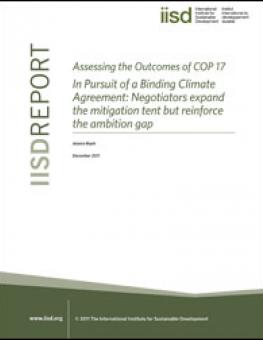
Assessing the Outcomes of COP 17 In Pursuit of a Binding Climate Agreement: Negotiators expand the mitigation tent but reinforce the ambition gap
IISD's Climate Change and Energy team assessed the outcomes of the UN Climate Change Conference (COP 17) held in Durban, South Africa November 28 to December 11, 2011.
COP 17 illustrated that there is a clear trade-off between the level of ambition and the inclusivity and robustness of a future agreement. To get countries like the U.S., China and India into the global mitigation tent, the agreements reached in Durban had to reflect a broad range of interests and be designed in a way that provided some flexibility, particularly for major emitters. The negotiations made it painfully clear that many entrenched divisions remain among key actors on critical issues. Nonetheless, the outcomes in Durban are a step forward in establishing an international agreement beyond Kyoto—one with mitigation commitments from all major emitters, including developed countries and several major developing countries.
You might also be interested in
The Cost of Fossil Fuel Reliance
Government support for fossil fuels reached at least USD 1.5 trillion in 2023, new data shows.
Increased Support Needed to Achieve India's Clean Energy Goals
India is on track to achieve many of its 2030 clean energy goals but needs to step up government support measures to accelerate the deployment of offshore wind, electric vehicles, and green hydrogen, according to a new report.
Ending Export Credits for Oil and Gas: How OECD countries can end 2024 with a climate win
For a year now, Organisation of Petroleum Exporting Countries (OECD) governments have been negotiating an agreement that could put an end to oil and gas export finance. Following the acrimony in Baku, this would be a very real way for the OECD to show policy coherence, respond to calls from the poorest countries to stop subsidizing fossil fuels, and shift public finance to solutions.
Fossil Fuel Production, Renewable Energy, and Subsidy Reform in Nationally Determined Contributions 3.0
This policy brief provides an analysis of the critical benchmarks and recommendations necessary for aligning nationally determined contributions (NDCs) with the 1.5 °C target.